Entrepreneurial Personality and Motivation
VerifiedAdded on 2020/06/04
|13
|3916
|34
AI Summary
This assignment delves into the relationship between entrepreneurial personality and motivation. It examines various methods through which entrepreneurial characteristics manifest in individual motivations. The text also highlights how personal backgrounds, experiences, and knowledge can either foster or hinder an aspiring entrepreneur's journey.
Contribute Materials
Your contribution can guide someone’s learning journey. Share your
documents today.

Entrepreneurship and Small
Business Management
Business Management
Secure Best Marks with AI Grader
Need help grading? Try our AI Grader for instant feedback on your assignments.
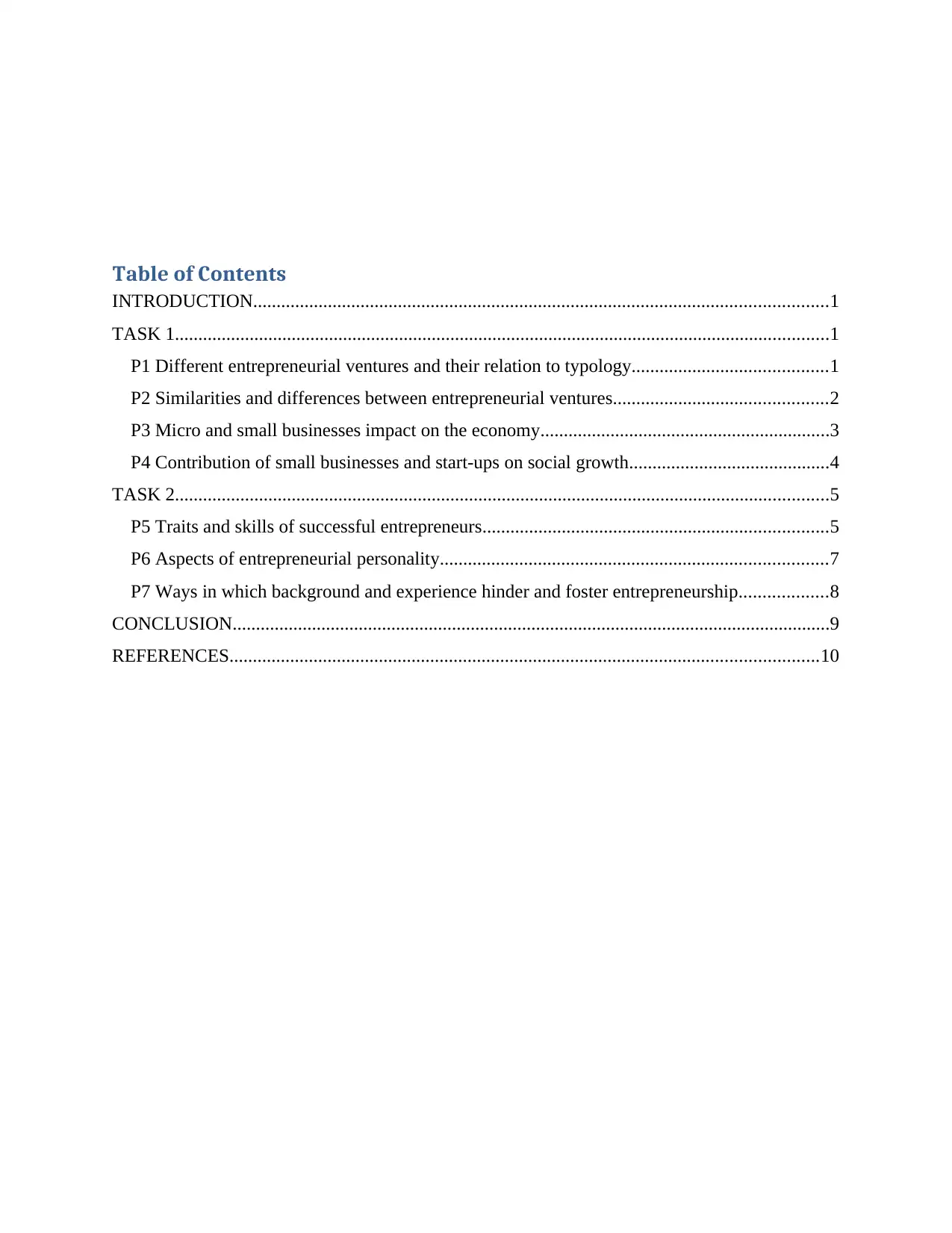
Table of Contents
INTRODUCTION...........................................................................................................................1
TASK 1............................................................................................................................................1
P1 Different entrepreneurial ventures and their relation to typology..........................................1
P2 Similarities and differences between entrepreneurial ventures..............................................2
P3 Micro and small businesses impact on the economy..............................................................3
P4 Contribution of small businesses and start-ups on social growth...........................................4
TASK 2............................................................................................................................................5
P5 Traits and skills of successful entrepreneurs..........................................................................5
P6 Aspects of entrepreneurial personality...................................................................................7
P7 Ways in which background and experience hinder and foster entrepreneurship...................8
CONCLUSION................................................................................................................................9
REFERENCES..............................................................................................................................10
INTRODUCTION...........................................................................................................................1
TASK 1............................................................................................................................................1
P1 Different entrepreneurial ventures and their relation to typology..........................................1
P2 Similarities and differences between entrepreneurial ventures..............................................2
P3 Micro and small businesses impact on the economy..............................................................3
P4 Contribution of small businesses and start-ups on social growth...........................................4
TASK 2............................................................................................................................................5
P5 Traits and skills of successful entrepreneurs..........................................................................5
P6 Aspects of entrepreneurial personality...................................................................................7
P7 Ways in which background and experience hinder and foster entrepreneurship...................8
CONCLUSION................................................................................................................................9
REFERENCES..............................................................................................................................10

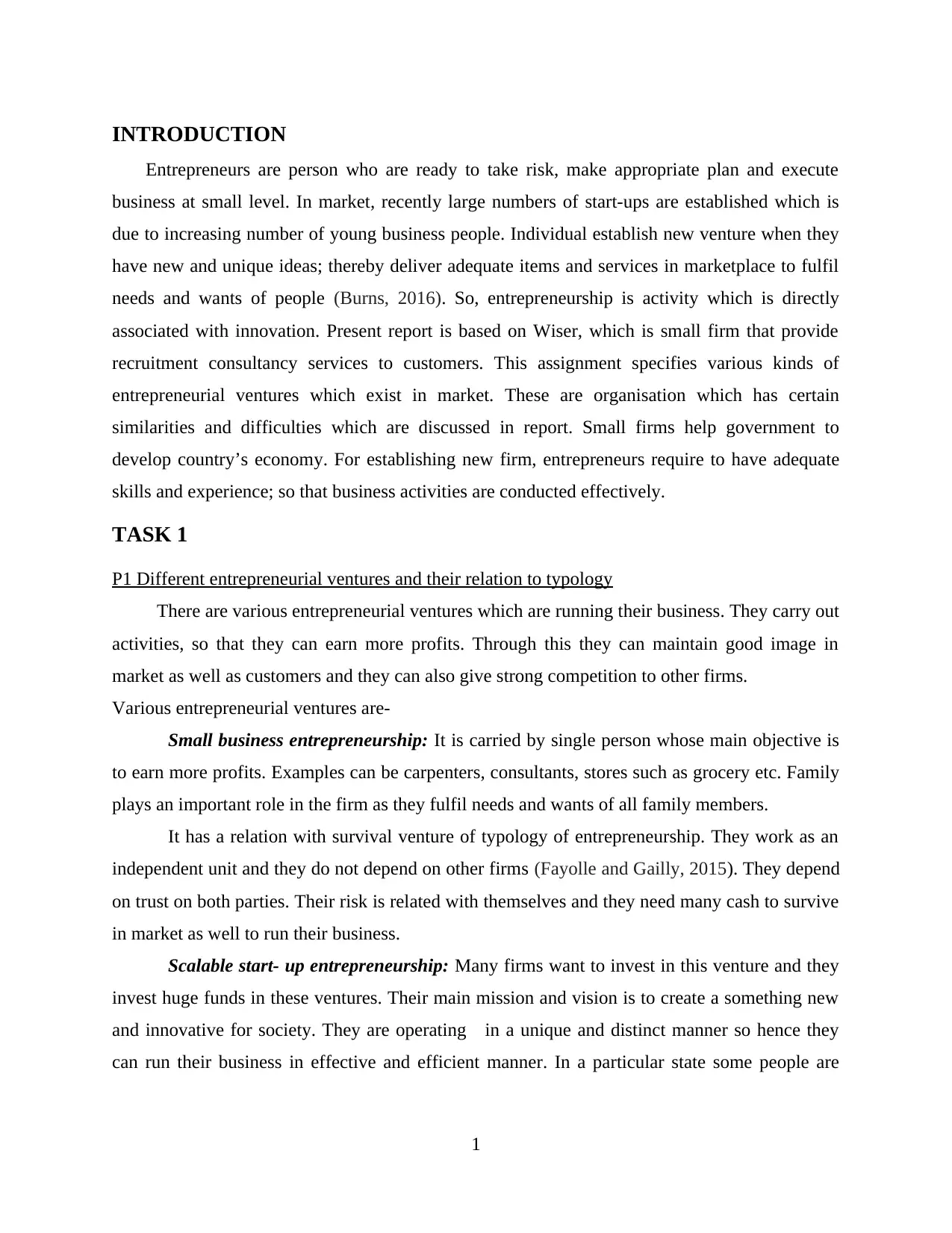
INTRODUCTION
Entrepreneurs are person who are ready to take risk, make appropriate plan and execute
business at small level. In market, recently large numbers of start-ups are established which is
due to increasing number of young business people. Individual establish new venture when they
have new and unique ideas; thereby deliver adequate items and services in marketplace to fulfil
needs and wants of people (Burns, 2016). So, entrepreneurship is activity which is directly
associated with innovation. Present report is based on Wiser, which is small firm that provide
recruitment consultancy services to customers. This assignment specifies various kinds of
entrepreneurial ventures which exist in market. These are organisation which has certain
similarities and difficulties which are discussed in report. Small firms help government to
develop country’s economy. For establishing new firm, entrepreneurs require to have adequate
skills and experience; so that business activities are conducted effectively.
TASK 1
P1 Different entrepreneurial ventures and their relation to typology
There are various entrepreneurial ventures which are running their business. They carry out
activities, so that they can earn more profits. Through this they can maintain good image in
market as well as customers and they can also give strong competition to other firms.
Various entrepreneurial ventures are-
Small business entrepreneurship: It is carried by single person whose main objective is
to earn more profits. Examples can be carpenters, consultants, stores such as grocery etc. Family
plays an important role in the firm as they fulfil needs and wants of all family members.
It has a relation with survival venture of typology of entrepreneurship. They work as an
independent unit and they do not depend on other firms (Fayolle and Gailly, 2015). They depend
on trust on both parties. Their risk is related with themselves and they need many cash to survive
in market as well to run their business.
Scalable start- up entrepreneurship: Many firms want to invest in this venture and they
invest huge funds in these ventures. Their main mission and vision is to create a something new
and innovative for society. They are operating in a unique and distinct manner so hence they
can run their business in effective and efficient manner. In a particular state some people are
1
Entrepreneurs are person who are ready to take risk, make appropriate plan and execute
business at small level. In market, recently large numbers of start-ups are established which is
due to increasing number of young business people. Individual establish new venture when they
have new and unique ideas; thereby deliver adequate items and services in marketplace to fulfil
needs and wants of people (Burns, 2016). So, entrepreneurship is activity which is directly
associated with innovation. Present report is based on Wiser, which is small firm that provide
recruitment consultancy services to customers. This assignment specifies various kinds of
entrepreneurial ventures which exist in market. These are organisation which has certain
similarities and difficulties which are discussed in report. Small firms help government to
develop country’s economy. For establishing new firm, entrepreneurs require to have adequate
skills and experience; so that business activities are conducted effectively.
TASK 1
P1 Different entrepreneurial ventures and their relation to typology
There are various entrepreneurial ventures which are running their business. They carry out
activities, so that they can earn more profits. Through this they can maintain good image in
market as well as customers and they can also give strong competition to other firms.
Various entrepreneurial ventures are-
Small business entrepreneurship: It is carried by single person whose main objective is
to earn more profits. Examples can be carpenters, consultants, stores such as grocery etc. Family
plays an important role in the firm as they fulfil needs and wants of all family members.
It has a relation with survival venture of typology of entrepreneurship. They work as an
independent unit and they do not depend on other firms (Fayolle and Gailly, 2015). They depend
on trust on both parties. Their risk is related with themselves and they need many cash to survive
in market as well to run their business.
Scalable start- up entrepreneurship: Many firms want to invest in this venture and they
invest huge funds in these ventures. Their main mission and vision is to create a something new
and innovative for society. They are operating in a unique and distinct manner so hence they
can run their business in effective and efficient manner. In a particular state some people are
1
Secure Best Marks with AI Grader
Need help grading? Try our AI Grader for instant feedback on your assignments.
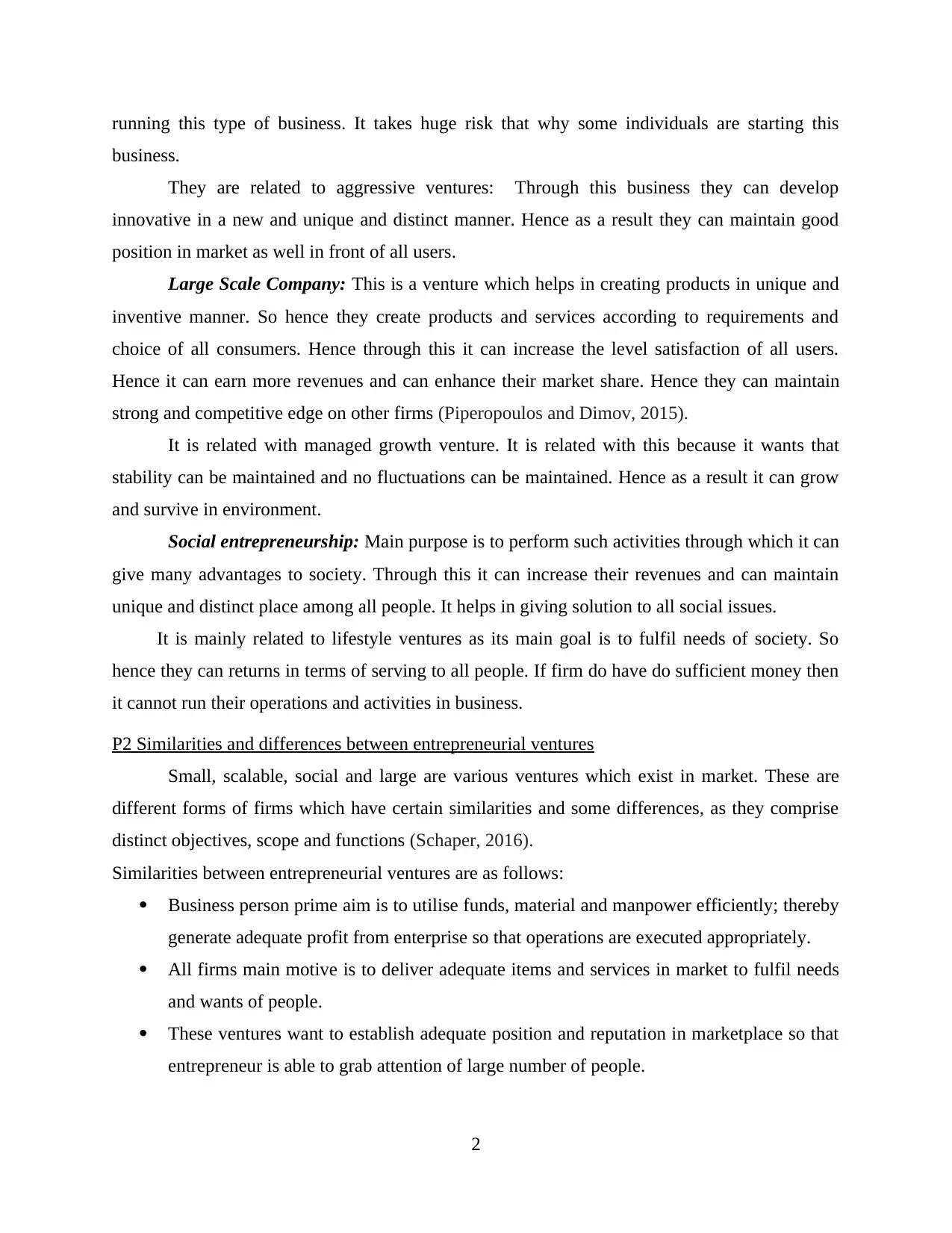
running this type of business. It takes huge risk that why some individuals are starting this
business.
They are related to aggressive ventures: Through this business they can develop
innovative in a new and unique and distinct manner. Hence as a result they can maintain good
position in market as well in front of all users.
Large Scale Company: This is a venture which helps in creating products in unique and
inventive manner. So hence they create products and services according to requirements and
choice of all consumers. Hence through this it can increase the level satisfaction of all users.
Hence it can earn more revenues and can enhance their market share. Hence they can maintain
strong and competitive edge on other firms (Piperopoulos and Dimov, 2015).
It is related with managed growth venture. It is related with this because it wants that
stability can be maintained and no fluctuations can be maintained. Hence as a result it can grow
and survive in environment.
Social entrepreneurship: Main purpose is to perform such activities through which it can
give many advantages to society. Through this it can increase their revenues and can maintain
unique and distinct place among all people. It helps in giving solution to all social issues.
It is mainly related to lifestyle ventures as its main goal is to fulfil needs of society. So
hence they can returns in terms of serving to all people. If firm do have do sufficient money then
it cannot run their operations and activities in business.
P2 Similarities and differences between entrepreneurial ventures
Small, scalable, social and large are various ventures which exist in market. These are
different forms of firms which have certain similarities and some differences, as they comprise
distinct objectives, scope and functions (Schaper, 2016).
Similarities between entrepreneurial ventures are as follows:
Business person prime aim is to utilise funds, material and manpower efficiently; thereby
generate adequate profit from enterprise so that operations are executed appropriately.
All firms main motive is to deliver adequate items and services in market to fulfil needs
and wants of people.
These ventures want to establish adequate position and reputation in marketplace so that
entrepreneur is able to grab attention of large number of people.
2
business.
They are related to aggressive ventures: Through this business they can develop
innovative in a new and unique and distinct manner. Hence as a result they can maintain good
position in market as well in front of all users.
Large Scale Company: This is a venture which helps in creating products in unique and
inventive manner. So hence they create products and services according to requirements and
choice of all consumers. Hence through this it can increase the level satisfaction of all users.
Hence it can earn more revenues and can enhance their market share. Hence they can maintain
strong and competitive edge on other firms (Piperopoulos and Dimov, 2015).
It is related with managed growth venture. It is related with this because it wants that
stability can be maintained and no fluctuations can be maintained. Hence as a result it can grow
and survive in environment.
Social entrepreneurship: Main purpose is to perform such activities through which it can
give many advantages to society. Through this it can increase their revenues and can maintain
unique and distinct place among all people. It helps in giving solution to all social issues.
It is mainly related to lifestyle ventures as its main goal is to fulfil needs of society. So
hence they can returns in terms of serving to all people. If firm do have do sufficient money then
it cannot run their operations and activities in business.
P2 Similarities and differences between entrepreneurial ventures
Small, scalable, social and large are various ventures which exist in market. These are
different forms of firms which have certain similarities and some differences, as they comprise
distinct objectives, scope and functions (Schaper, 2016).
Similarities between entrepreneurial ventures are as follows:
Business person prime aim is to utilise funds, material and manpower efficiently; thereby
generate adequate profit from enterprise so that operations are executed appropriately.
All firms main motive is to deliver adequate items and services in market to fulfil needs
and wants of people.
These ventures want to establish adequate position and reputation in marketplace so that
entrepreneur is able to grab attention of large number of people.
2
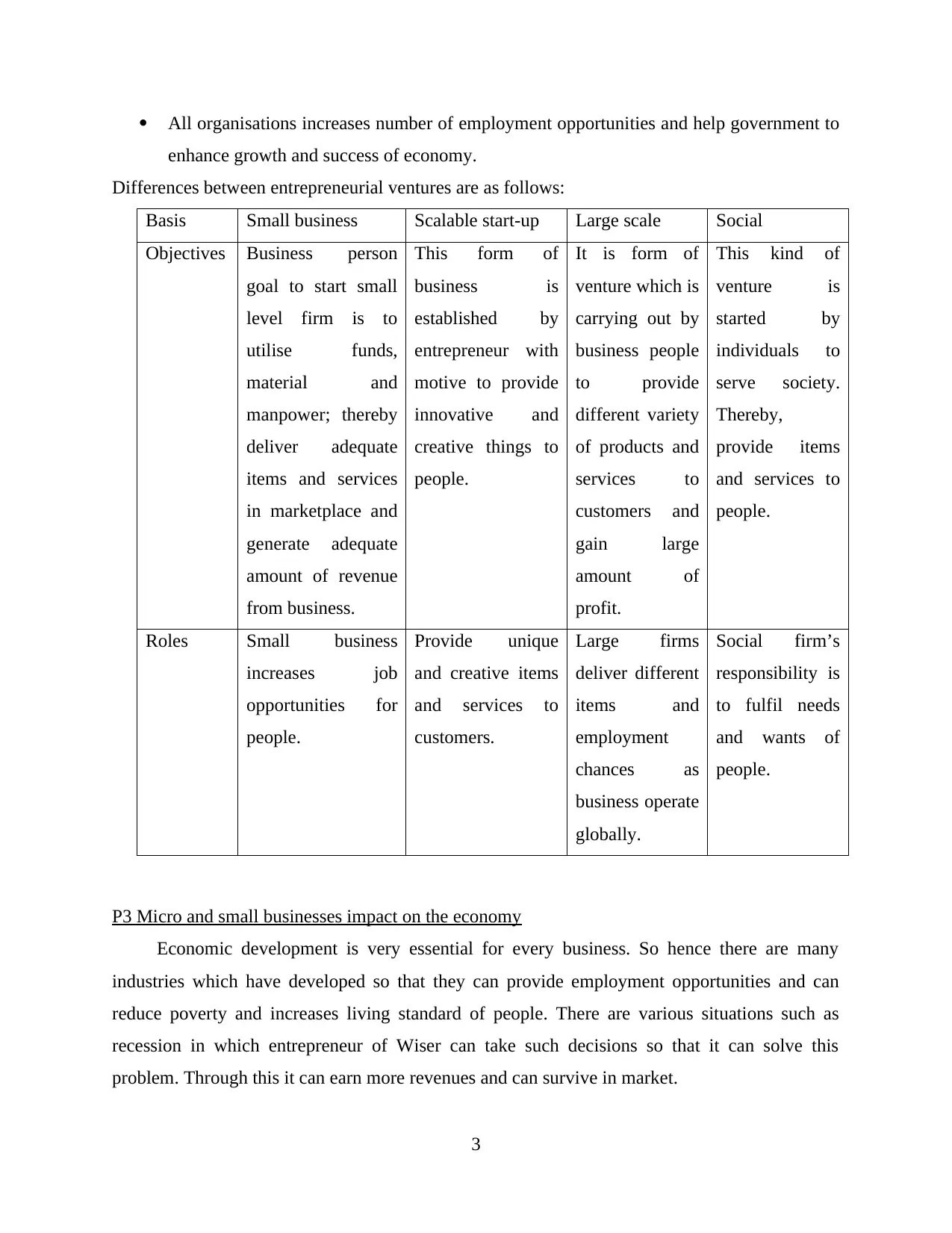
All organisations increases number of employment opportunities and help government to
enhance growth and success of economy.
Differences between entrepreneurial ventures are as follows:
Basis Small business Scalable start-up Large scale Social
Objectives Business person
goal to start small
level firm is to
utilise funds,
material and
manpower; thereby
deliver adequate
items and services
in marketplace and
generate adequate
amount of revenue
from business.
This form of
business is
established by
entrepreneur with
motive to provide
innovative and
creative things to
people.
It is form of
venture which is
carrying out by
business people
to provide
different variety
of products and
services to
customers and
gain large
amount of
profit.
This kind of
venture is
started by
individuals to
serve society.
Thereby,
provide items
and services to
people.
Roles Small business
increases job
opportunities for
people.
Provide unique
and creative items
and services to
customers.
Large firms
deliver different
items and
employment
chances as
business operate
globally.
Social firm’s
responsibility is
to fulfil needs
and wants of
people.
P3 Micro and small businesses impact on the economy
Economic development is very essential for every business. So hence there are many
industries which have developed so that they can provide employment opportunities and can
reduce poverty and increases living standard of people. There are various situations such as
recession in which entrepreneur of Wiser can take such decisions so that it can solve this
problem. Through this it can earn more revenues and can survive in market.
3
enhance growth and success of economy.
Differences between entrepreneurial ventures are as follows:
Basis Small business Scalable start-up Large scale Social
Objectives Business person
goal to start small
level firm is to
utilise funds,
material and
manpower; thereby
deliver adequate
items and services
in marketplace and
generate adequate
amount of revenue
from business.
This form of
business is
established by
entrepreneur with
motive to provide
innovative and
creative things to
people.
It is form of
venture which is
carrying out by
business people
to provide
different variety
of products and
services to
customers and
gain large
amount of
profit.
This kind of
venture is
started by
individuals to
serve society.
Thereby,
provide items
and services to
people.
Roles Small business
increases job
opportunities for
people.
Provide unique
and creative items
and services to
customers.
Large firms
deliver different
items and
employment
chances as
business operate
globally.
Social firm’s
responsibility is
to fulfil needs
and wants of
people.
P3 Micro and small businesses impact on the economy
Economic development is very essential for every business. So hence there are many
industries which have developed so that they can provide employment opportunities and can
reduce poverty and increases living standard of people. There are various situations such as
recession in which entrepreneur of Wiser can take such decisions so that it can solve this
problem. Through this it can earn more revenues and can survive in market.
3
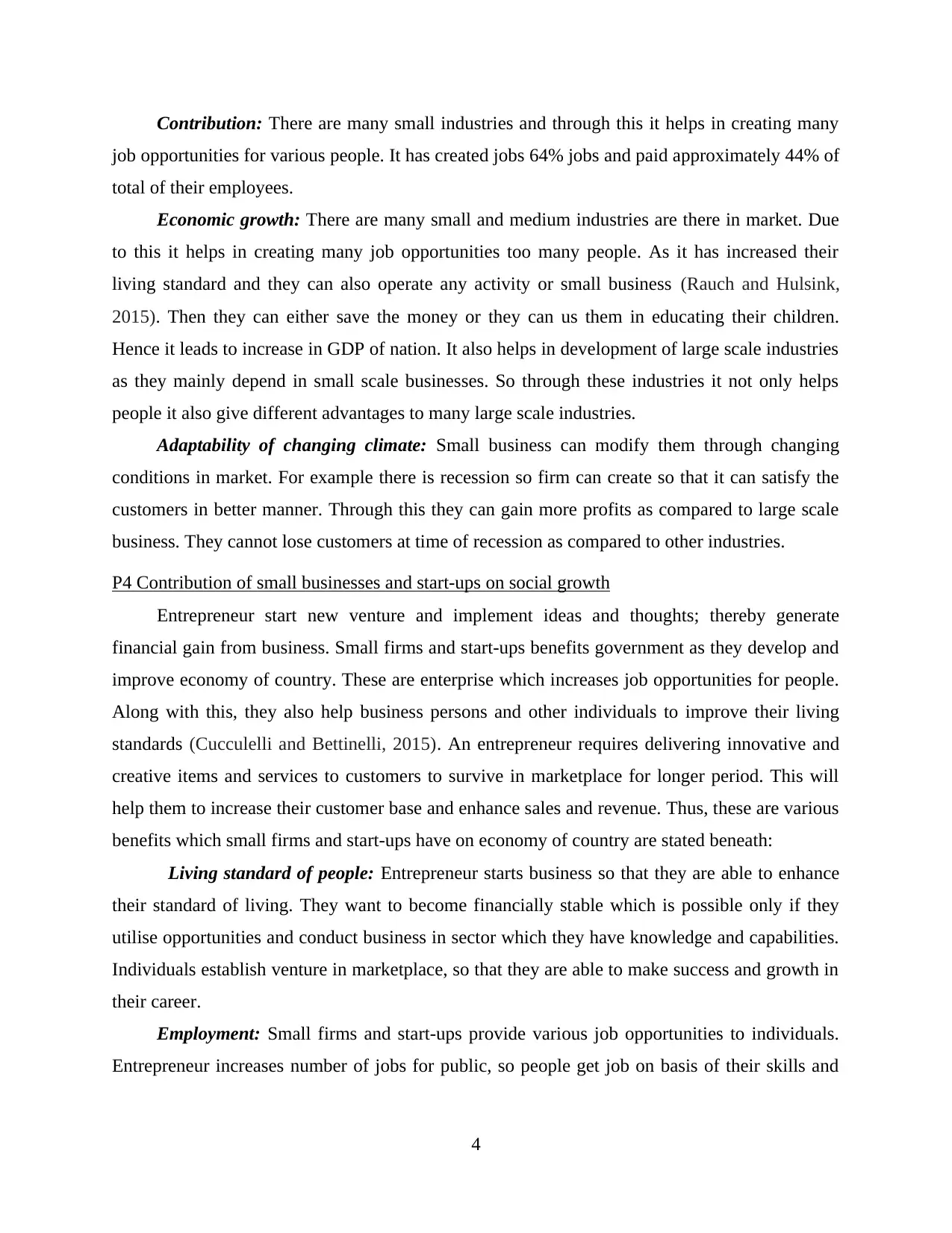
Contribution: There are many small industries and through this it helps in creating many
job opportunities for various people. It has created jobs 64% jobs and paid approximately 44% of
total of their employees.
Economic growth: There are many small and medium industries are there in market. Due
to this it helps in creating many job opportunities too many people. As it has increased their
living standard and they can also operate any activity or small business (Rauch and Hulsink,
2015). Then they can either save the money or they can us them in educating their children.
Hence it leads to increase in GDP of nation. It also helps in development of large scale industries
as they mainly depend in small scale businesses. So through these industries it not only helps
people it also give different advantages to many large scale industries.
Adaptability of changing climate: Small business can modify them through changing
conditions in market. For example there is recession so firm can create so that it can satisfy the
customers in better manner. Through this they can gain more profits as compared to large scale
business. They cannot lose customers at time of recession as compared to other industries.
P4 Contribution of small businesses and start-ups on social growth
Entrepreneur start new venture and implement ideas and thoughts; thereby generate
financial gain from business. Small firms and start-ups benefits government as they develop and
improve economy of country. These are enterprise which increases job opportunities for people.
Along with this, they also help business persons and other individuals to improve their living
standards (Cucculelli and Bettinelli, 2015). An entrepreneur requires delivering innovative and
creative items and services to customers to survive in marketplace for longer period. This will
help them to increase their customer base and enhance sales and revenue. Thus, these are various
benefits which small firms and start-ups have on economy of country are stated beneath:
Living standard of people: Entrepreneur starts business so that they are able to enhance
their standard of living. They want to become financially stable which is possible only if they
utilise opportunities and conduct business in sector which they have knowledge and capabilities.
Individuals establish venture in marketplace, so that they are able to make success and growth in
their career.
Employment: Small firms and start-ups provide various job opportunities to individuals.
Entrepreneur increases number of jobs for public, so people get job on basis of their skills and
4
job opportunities for various people. It has created jobs 64% jobs and paid approximately 44% of
total of their employees.
Economic growth: There are many small and medium industries are there in market. Due
to this it helps in creating many job opportunities too many people. As it has increased their
living standard and they can also operate any activity or small business (Rauch and Hulsink,
2015). Then they can either save the money or they can us them in educating their children.
Hence it leads to increase in GDP of nation. It also helps in development of large scale industries
as they mainly depend in small scale businesses. So through these industries it not only helps
people it also give different advantages to many large scale industries.
Adaptability of changing climate: Small business can modify them through changing
conditions in market. For example there is recession so firm can create so that it can satisfy the
customers in better manner. Through this they can gain more profits as compared to large scale
business. They cannot lose customers at time of recession as compared to other industries.
P4 Contribution of small businesses and start-ups on social growth
Entrepreneur start new venture and implement ideas and thoughts; thereby generate
financial gain from business. Small firms and start-ups benefits government as they develop and
improve economy of country. These are enterprise which increases job opportunities for people.
Along with this, they also help business persons and other individuals to improve their living
standards (Cucculelli and Bettinelli, 2015). An entrepreneur requires delivering innovative and
creative items and services to customers to survive in marketplace for longer period. This will
help them to increase their customer base and enhance sales and revenue. Thus, these are various
benefits which small firms and start-ups have on economy of country are stated beneath:
Living standard of people: Entrepreneur starts business so that they are able to enhance
their standard of living. They want to become financially stable which is possible only if they
utilise opportunities and conduct business in sector which they have knowledge and capabilities.
Individuals establish venture in marketplace, so that they are able to make success and growth in
their career.
Employment: Small firms and start-ups provide various job opportunities to individuals.
Entrepreneur increases number of jobs for public, so people get job on basis of their skills and
4
Paraphrase This Document
Need a fresh take? Get an instant paraphrase of this document with our AI Paraphraser
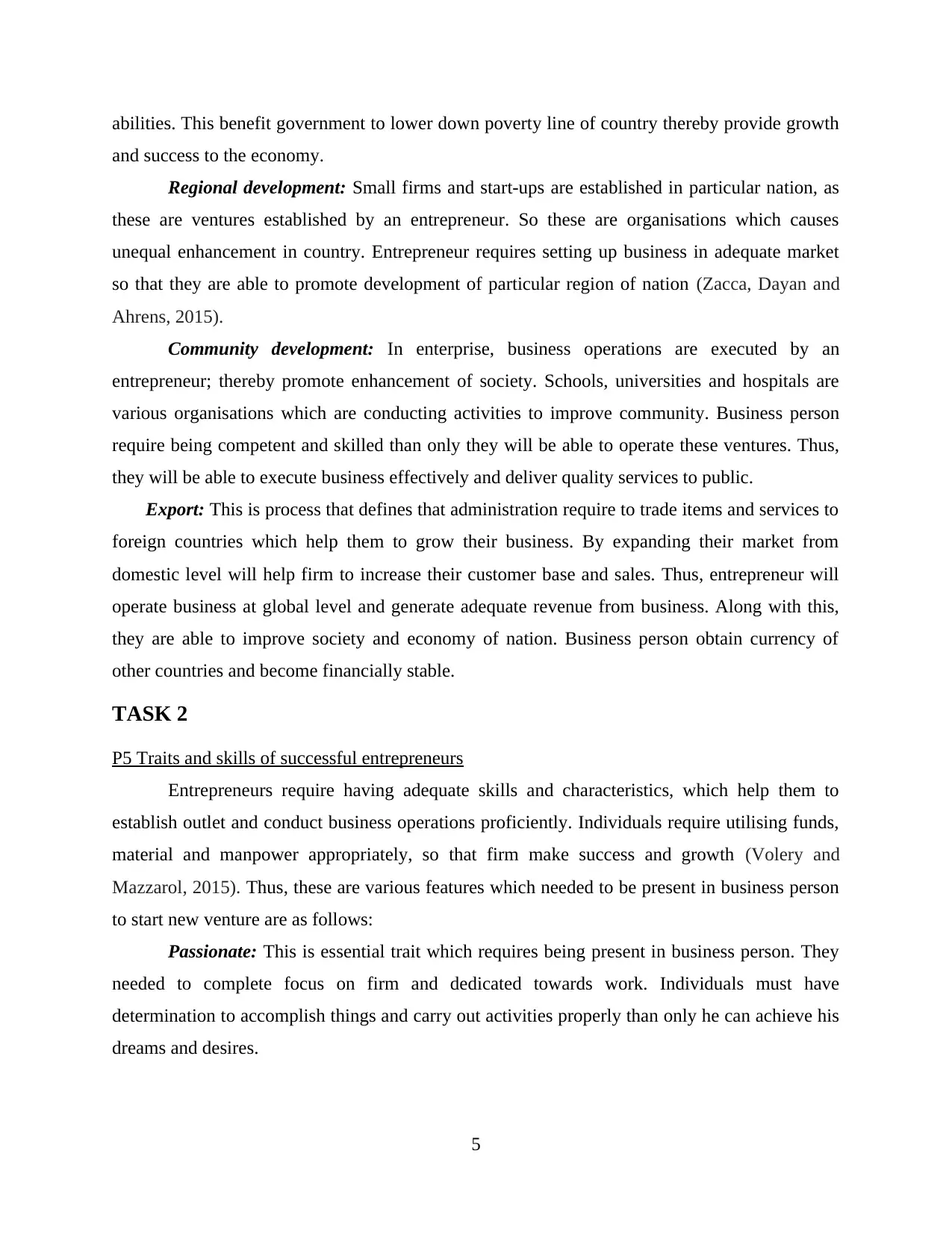
abilities. This benefit government to lower down poverty line of country thereby provide growth
and success to the economy.
Regional development: Small firms and start-ups are established in particular nation, as
these are ventures established by an entrepreneur. So these are organisations which causes
unequal enhancement in country. Entrepreneur requires setting up business in adequate market
so that they are able to promote development of particular region of nation (Zacca, Dayan and
Ahrens, 2015).
Community development: In enterprise, business operations are executed by an
entrepreneur; thereby promote enhancement of society. Schools, universities and hospitals are
various organisations which are conducting activities to improve community. Business person
require being competent and skilled than only they will be able to operate these ventures. Thus,
they will be able to execute business effectively and deliver quality services to public.
Export: This is process that defines that administration require to trade items and services to
foreign countries which help them to grow their business. By expanding their market from
domestic level will help firm to increase their customer base and sales. Thus, entrepreneur will
operate business at global level and generate adequate revenue from business. Along with this,
they are able to improve society and economy of nation. Business person obtain currency of
other countries and become financially stable.
TASK 2
P5 Traits and skills of successful entrepreneurs
Entrepreneurs require having adequate skills and characteristics, which help them to
establish outlet and conduct business operations proficiently. Individuals require utilising funds,
material and manpower appropriately, so that firm make success and growth (Volery and
Mazzarol, 2015). Thus, these are various features which needed to be present in business person
to start new venture are as follows:
Passionate: This is essential trait which requires being present in business person. They
needed to complete focus on firm and dedicated towards work. Individuals must have
determination to accomplish things and carry out activities properly than only he can achieve his
dreams and desires.
5
and success to the economy.
Regional development: Small firms and start-ups are established in particular nation, as
these are ventures established by an entrepreneur. So these are organisations which causes
unequal enhancement in country. Entrepreneur requires setting up business in adequate market
so that they are able to promote development of particular region of nation (Zacca, Dayan and
Ahrens, 2015).
Community development: In enterprise, business operations are executed by an
entrepreneur; thereby promote enhancement of society. Schools, universities and hospitals are
various organisations which are conducting activities to improve community. Business person
require being competent and skilled than only they will be able to operate these ventures. Thus,
they will be able to execute business effectively and deliver quality services to public.
Export: This is process that defines that administration require to trade items and services to
foreign countries which help them to grow their business. By expanding their market from
domestic level will help firm to increase their customer base and sales. Thus, entrepreneur will
operate business at global level and generate adequate revenue from business. Along with this,
they are able to improve society and economy of nation. Business person obtain currency of
other countries and become financially stable.
TASK 2
P5 Traits and skills of successful entrepreneurs
Entrepreneurs require having adequate skills and characteristics, which help them to
establish outlet and conduct business operations proficiently. Individuals require utilising funds,
material and manpower appropriately, so that firm make success and growth (Volery and
Mazzarol, 2015). Thus, these are various features which needed to be present in business person
to start new venture are as follows:
Passionate: This is essential trait which requires being present in business person. They
needed to complete focus on firm and dedicated towards work. Individuals must have
determination to accomplish things and carry out activities properly than only he can achieve his
dreams and desires.
5
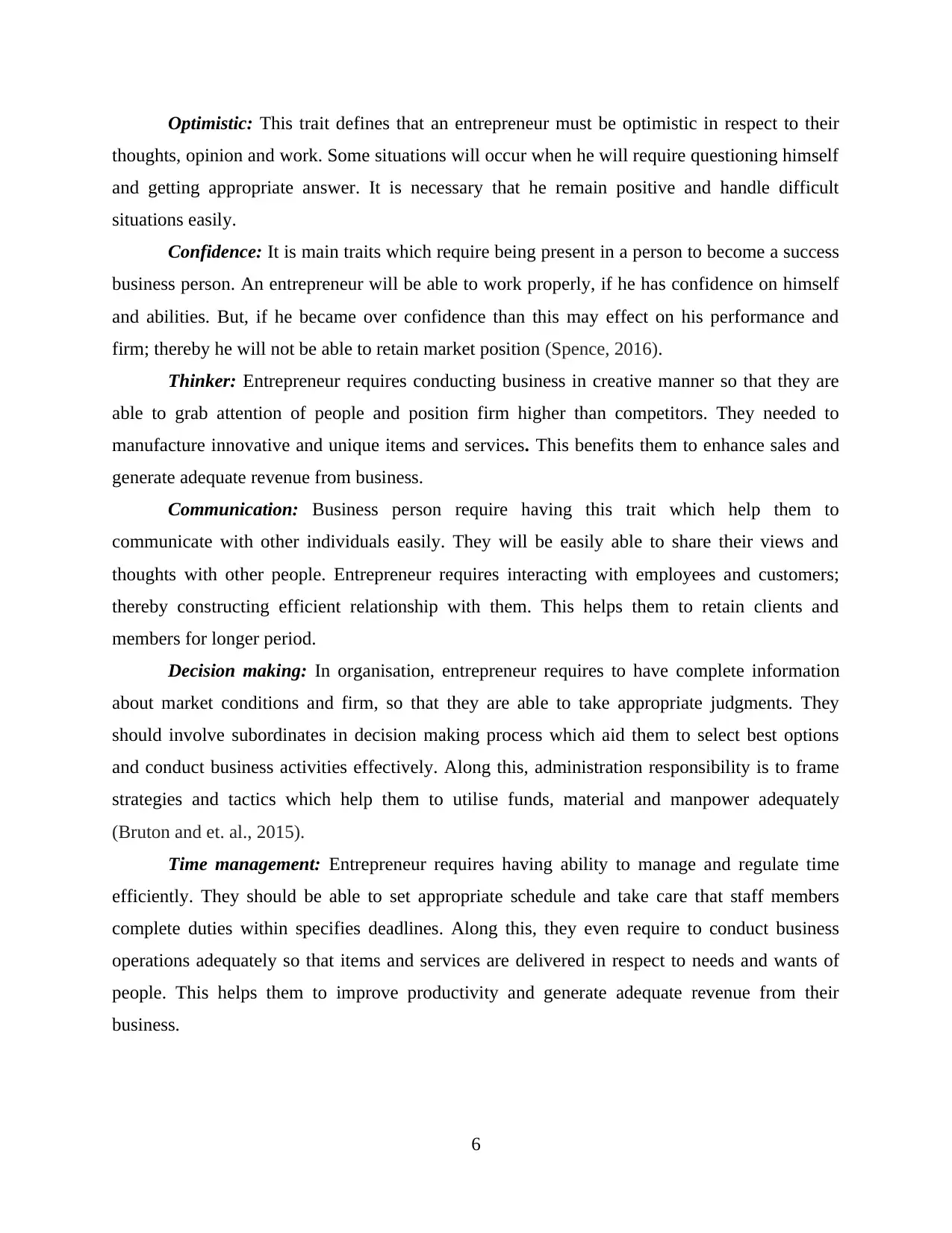
Optimistic: This trait defines that an entrepreneur must be optimistic in respect to their
thoughts, opinion and work. Some situations will occur when he will require questioning himself
and getting appropriate answer. It is necessary that he remain positive and handle difficult
situations easily.
Confidence: It is main traits which require being present in a person to become a success
business person. An entrepreneur will be able to work properly, if he has confidence on himself
and abilities. But, if he became over confidence than this may effect on his performance and
firm; thereby he will not be able to retain market position (Spence, 2016).
Thinker: Entrepreneur requires conducting business in creative manner so that they are
able to grab attention of people and position firm higher than competitors. They needed to
manufacture innovative and unique items and services. This benefits them to enhance sales and
generate adequate revenue from business.
Communication: Business person require having this trait which help them to
communicate with other individuals easily. They will be easily able to share their views and
thoughts with other people. Entrepreneur requires interacting with employees and customers;
thereby constructing efficient relationship with them. This helps them to retain clients and
members for longer period.
Decision making: In organisation, entrepreneur requires to have complete information
about market conditions and firm, so that they are able to take appropriate judgments. They
should involve subordinates in decision making process which aid them to select best options
and conduct business activities effectively. Along this, administration responsibility is to frame
strategies and tactics which help them to utilise funds, material and manpower adequately
(Bruton and et. al., 2015).
Time management: Entrepreneur requires having ability to manage and regulate time
efficiently. They should be able to set appropriate schedule and take care that staff members
complete duties within specifies deadlines. Along this, they even require to conduct business
operations adequately so that items and services are delivered in respect to needs and wants of
people. This helps them to improve productivity and generate adequate revenue from their
business.
6
thoughts, opinion and work. Some situations will occur when he will require questioning himself
and getting appropriate answer. It is necessary that he remain positive and handle difficult
situations easily.
Confidence: It is main traits which require being present in a person to become a success
business person. An entrepreneur will be able to work properly, if he has confidence on himself
and abilities. But, if he became over confidence than this may effect on his performance and
firm; thereby he will not be able to retain market position (Spence, 2016).
Thinker: Entrepreneur requires conducting business in creative manner so that they are
able to grab attention of people and position firm higher than competitors. They needed to
manufacture innovative and unique items and services. This benefits them to enhance sales and
generate adequate revenue from business.
Communication: Business person require having this trait which help them to
communicate with other individuals easily. They will be easily able to share their views and
thoughts with other people. Entrepreneur requires interacting with employees and customers;
thereby constructing efficient relationship with them. This helps them to retain clients and
members for longer period.
Decision making: In organisation, entrepreneur requires to have complete information
about market conditions and firm, so that they are able to take appropriate judgments. They
should involve subordinates in decision making process which aid them to select best options
and conduct business activities effectively. Along this, administration responsibility is to frame
strategies and tactics which help them to utilise funds, material and manpower adequately
(Bruton and et. al., 2015).
Time management: Entrepreneur requires having ability to manage and regulate time
efficiently. They should be able to set appropriate schedule and take care that staff members
complete duties within specifies deadlines. Along this, they even require to conduct business
operations adequately so that items and services are delivered in respect to needs and wants of
people. This helps them to improve productivity and generate adequate revenue from their
business.
6
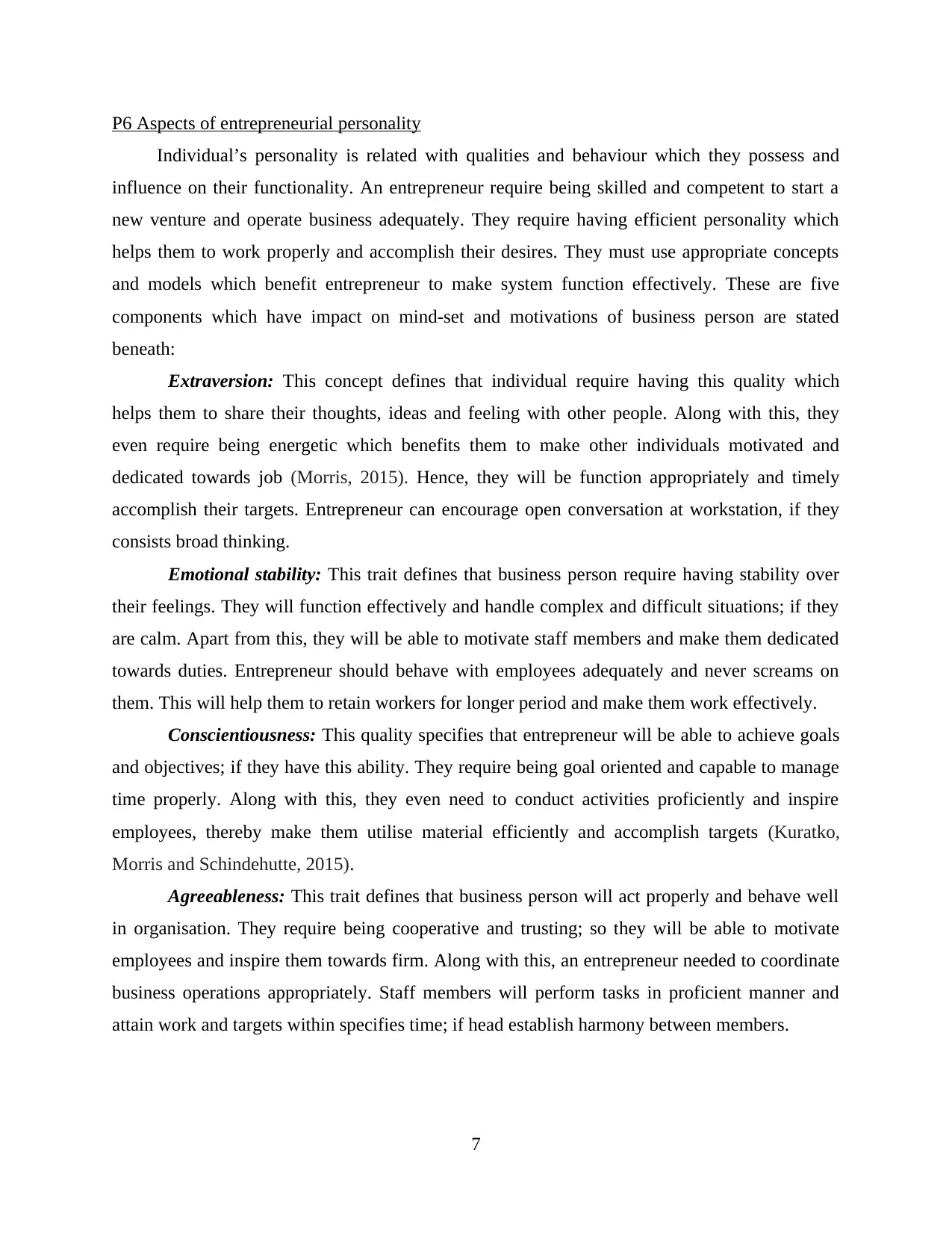
P6 Aspects of entrepreneurial personality
Individual’s personality is related with qualities and behaviour which they possess and
influence on their functionality. An entrepreneur require being skilled and competent to start a
new venture and operate business adequately. They require having efficient personality which
helps them to work properly and accomplish their desires. They must use appropriate concepts
and models which benefit entrepreneur to make system function effectively. These are five
components which have impact on mind-set and motivations of business person are stated
beneath:
Extraversion: This concept defines that individual require having this quality which
helps them to share their thoughts, ideas and feeling with other people. Along with this, they
even require being energetic which benefits them to make other individuals motivated and
dedicated towards job (Morris, 2015). Hence, they will be function appropriately and timely
accomplish their targets. Entrepreneur can encourage open conversation at workstation, if they
consists broad thinking.
Emotional stability: This trait defines that business person require having stability over
their feelings. They will function effectively and handle complex and difficult situations; if they
are calm. Apart from this, they will be able to motivate staff members and make them dedicated
towards duties. Entrepreneur should behave with employees adequately and never screams on
them. This will help them to retain workers for longer period and make them work effectively.
Conscientiousness: This quality specifies that entrepreneur will be able to achieve goals
and objectives; if they have this ability. They require being goal oriented and capable to manage
time properly. Along with this, they even need to conduct activities proficiently and inspire
employees, thereby make them utilise material efficiently and accomplish targets (Kuratko,
Morris and Schindehutte, 2015).
Agreeableness: This trait defines that business person will act properly and behave well
in organisation. They require being cooperative and trusting; so they will be able to motivate
employees and inspire them towards firm. Along with this, an entrepreneur needed to coordinate
business operations appropriately. Staff members will perform tasks in proficient manner and
attain work and targets within specifies time; if head establish harmony between members.
7
Individual’s personality is related with qualities and behaviour which they possess and
influence on their functionality. An entrepreneur require being skilled and competent to start a
new venture and operate business adequately. They require having efficient personality which
helps them to work properly and accomplish their desires. They must use appropriate concepts
and models which benefit entrepreneur to make system function effectively. These are five
components which have impact on mind-set and motivations of business person are stated
beneath:
Extraversion: This concept defines that individual require having this quality which
helps them to share their thoughts, ideas and feeling with other people. Along with this, they
even require being energetic which benefits them to make other individuals motivated and
dedicated towards job (Morris, 2015). Hence, they will be function appropriately and timely
accomplish their targets. Entrepreneur can encourage open conversation at workstation, if they
consists broad thinking.
Emotional stability: This trait defines that business person require having stability over
their feelings. They will function effectively and handle complex and difficult situations; if they
are calm. Apart from this, they will be able to motivate staff members and make them dedicated
towards duties. Entrepreneur should behave with employees adequately and never screams on
them. This will help them to retain workers for longer period and make them work effectively.
Conscientiousness: This quality specifies that entrepreneur will be able to achieve goals
and objectives; if they have this ability. They require being goal oriented and capable to manage
time properly. Along with this, they even need to conduct activities proficiently and inspire
employees, thereby make them utilise material efficiently and accomplish targets (Kuratko,
Morris and Schindehutte, 2015).
Agreeableness: This trait defines that business person will act properly and behave well
in organisation. They require being cooperative and trusting; so they will be able to motivate
employees and inspire them towards firm. Along with this, an entrepreneur needed to coordinate
business operations appropriately. Staff members will perform tasks in proficient manner and
attain work and targets within specifies time; if head establish harmony between members.
7
Secure Best Marks with AI Grader
Need help grading? Try our AI Grader for instant feedback on your assignments.
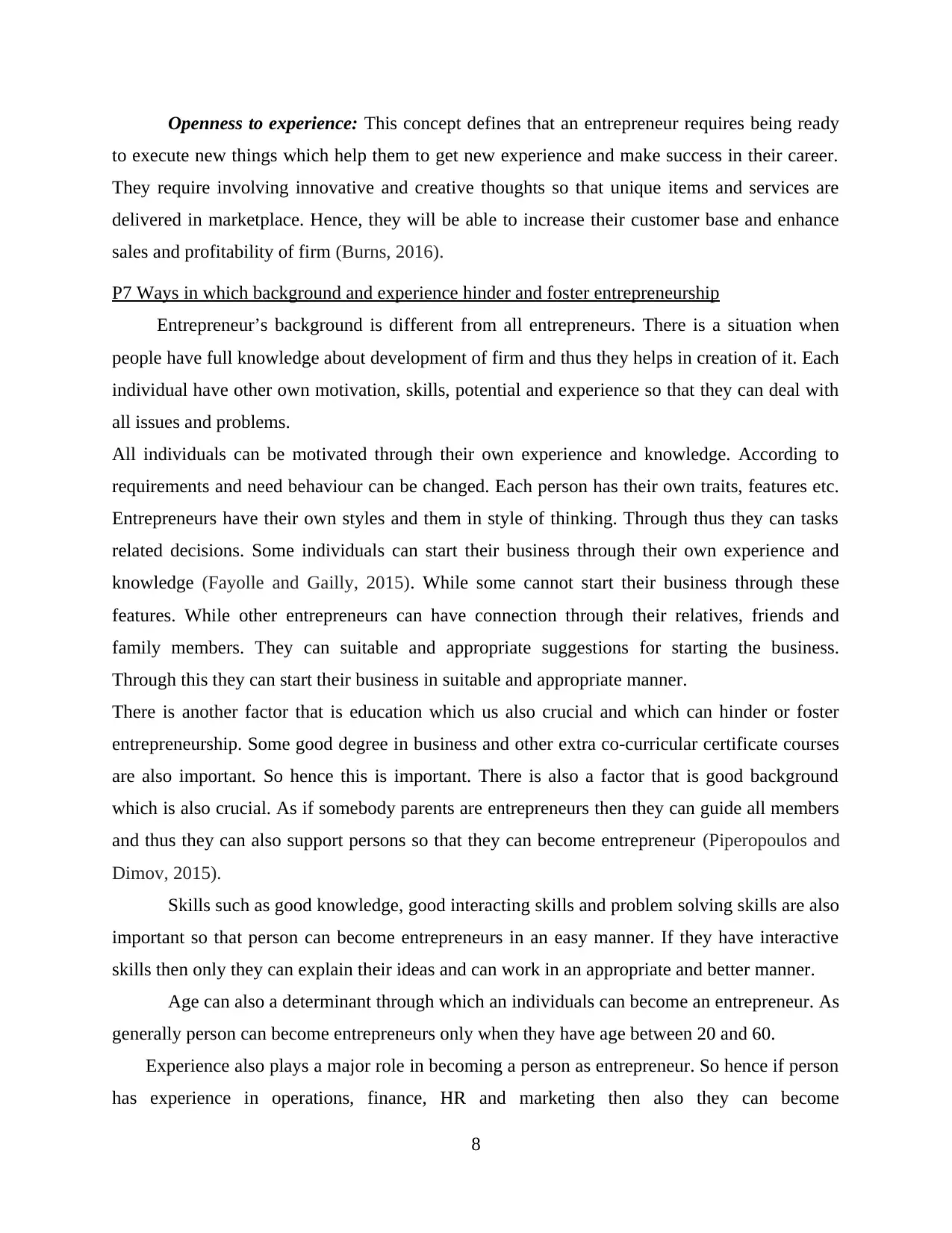
Openness to experience: This concept defines that an entrepreneur requires being ready
to execute new things which help them to get new experience and make success in their career.
They require involving innovative and creative thoughts so that unique items and services are
delivered in marketplace. Hence, they will be able to increase their customer base and enhance
sales and profitability of firm (Burns, 2016).
P7 Ways in which background and experience hinder and foster entrepreneurship
Entrepreneur’s background is different from all entrepreneurs. There is a situation when
people have full knowledge about development of firm and thus they helps in creation of it. Each
individual have other own motivation, skills, potential and experience so that they can deal with
all issues and problems.
All individuals can be motivated through their own experience and knowledge. According to
requirements and need behaviour can be changed. Each person has their own traits, features etc.
Entrepreneurs have their own styles and them in style of thinking. Through thus they can tasks
related decisions. Some individuals can start their business through their own experience and
knowledge (Fayolle and Gailly, 2015). While some cannot start their business through these
features. While other entrepreneurs can have connection through their relatives, friends and
family members. They can suitable and appropriate suggestions for starting the business.
Through this they can start their business in suitable and appropriate manner.
There is another factor that is education which us also crucial and which can hinder or foster
entrepreneurship. Some good degree in business and other extra co-curricular certificate courses
are also important. So hence this is important. There is also a factor that is good background
which is also crucial. As if somebody parents are entrepreneurs then they can guide all members
and thus they can also support persons so that they can become entrepreneur (Piperopoulos and
Dimov, 2015).
Skills such as good knowledge, good interacting skills and problem solving skills are also
important so that person can become entrepreneurs in an easy manner. If they have interactive
skills then only they can explain their ideas and can work in an appropriate and better manner.
Age can also a determinant through which an individuals can become an entrepreneur. As
generally person can become entrepreneurs only when they have age between 20 and 60.
Experience also plays a major role in becoming a person as entrepreneur. So hence if person
has experience in operations, finance, HR and marketing then also they can become
8
to execute new things which help them to get new experience and make success in their career.
They require involving innovative and creative thoughts so that unique items and services are
delivered in marketplace. Hence, they will be able to increase their customer base and enhance
sales and profitability of firm (Burns, 2016).
P7 Ways in which background and experience hinder and foster entrepreneurship
Entrepreneur’s background is different from all entrepreneurs. There is a situation when
people have full knowledge about development of firm and thus they helps in creation of it. Each
individual have other own motivation, skills, potential and experience so that they can deal with
all issues and problems.
All individuals can be motivated through their own experience and knowledge. According to
requirements and need behaviour can be changed. Each person has their own traits, features etc.
Entrepreneurs have their own styles and them in style of thinking. Through thus they can tasks
related decisions. Some individuals can start their business through their own experience and
knowledge (Fayolle and Gailly, 2015). While some cannot start their business through these
features. While other entrepreneurs can have connection through their relatives, friends and
family members. They can suitable and appropriate suggestions for starting the business.
Through this they can start their business in suitable and appropriate manner.
There is another factor that is education which us also crucial and which can hinder or foster
entrepreneurship. Some good degree in business and other extra co-curricular certificate courses
are also important. So hence this is important. There is also a factor that is good background
which is also crucial. As if somebody parents are entrepreneurs then they can guide all members
and thus they can also support persons so that they can become entrepreneur (Piperopoulos and
Dimov, 2015).
Skills such as good knowledge, good interacting skills and problem solving skills are also
important so that person can become entrepreneurs in an easy manner. If they have interactive
skills then only they can explain their ideas and can work in an appropriate and better manner.
Age can also a determinant through which an individuals can become an entrepreneur. As
generally person can become entrepreneurs only when they have age between 20 and 60.
Experience also plays a major role in becoming a person as entrepreneur. So hence if person
has experience in operations, finance, HR and marketing then also they can become
8
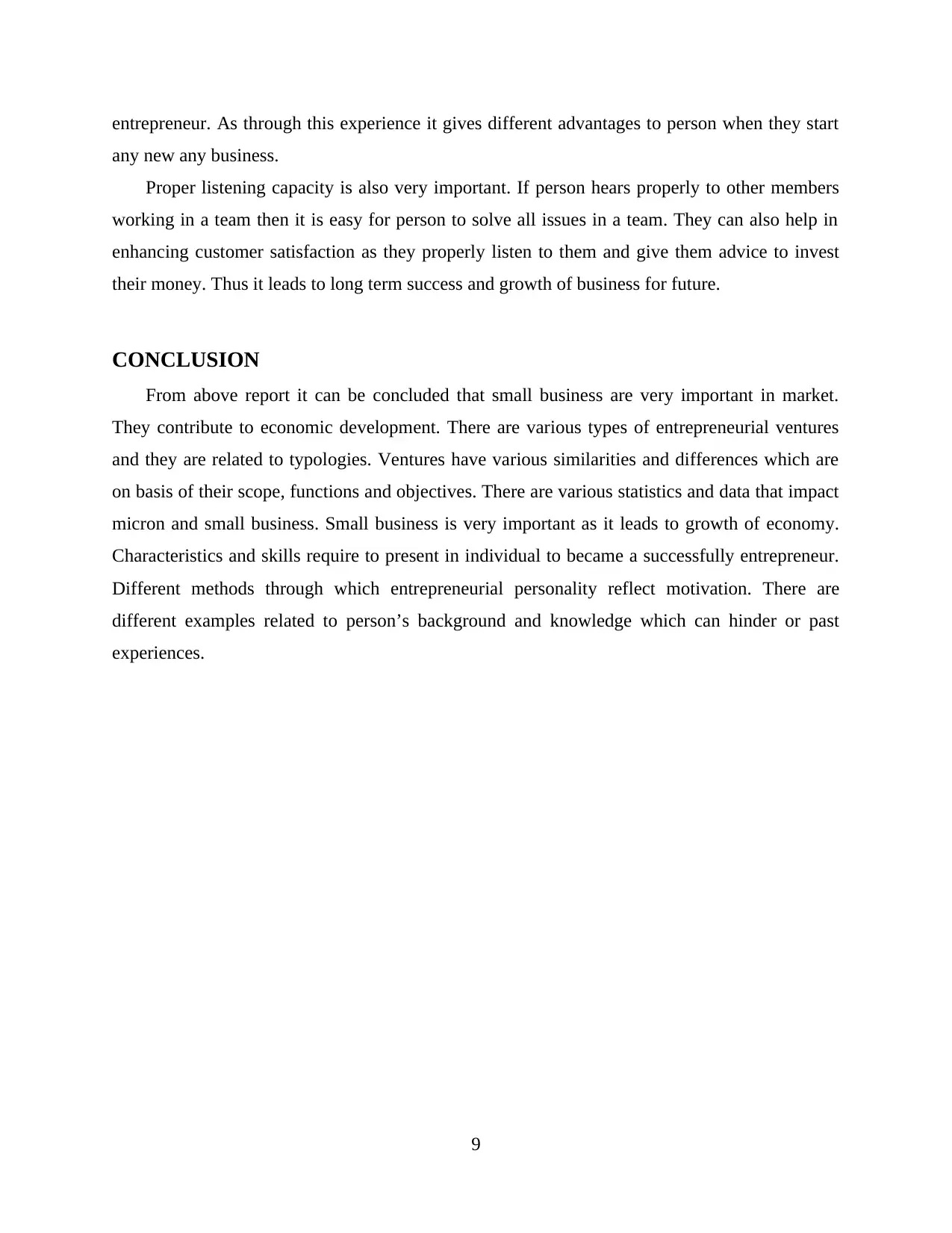
entrepreneur. As through this experience it gives different advantages to person when they start
any new any business.
Proper listening capacity is also very important. If person hears properly to other members
working in a team then it is easy for person to solve all issues in a team. They can also help in
enhancing customer satisfaction as they properly listen to them and give them advice to invest
their money. Thus it leads to long term success and growth of business for future.
CONCLUSION
From above report it can be concluded that small business are very important in market.
They contribute to economic development. There are various types of entrepreneurial ventures
and they are related to typologies. Ventures have various similarities and differences which are
on basis of their scope, functions and objectives. There are various statistics and data that impact
micron and small business. Small business is very important as it leads to growth of economy.
Characteristics and skills require to present in individual to became a successfully entrepreneur.
Different methods through which entrepreneurial personality reflect motivation. There are
different examples related to person’s background and knowledge which can hinder or past
experiences.
9
any new any business.
Proper listening capacity is also very important. If person hears properly to other members
working in a team then it is easy for person to solve all issues in a team. They can also help in
enhancing customer satisfaction as they properly listen to them and give them advice to invest
their money. Thus it leads to long term success and growth of business for future.
CONCLUSION
From above report it can be concluded that small business are very important in market.
They contribute to economic development. There are various types of entrepreneurial ventures
and they are related to typologies. Ventures have various similarities and differences which are
on basis of their scope, functions and objectives. There are various statistics and data that impact
micron and small business. Small business is very important as it leads to growth of economy.
Characteristics and skills require to present in individual to became a successfully entrepreneur.
Different methods through which entrepreneurial personality reflect motivation. There are
different examples related to person’s background and knowledge which can hinder or past
experiences.
9
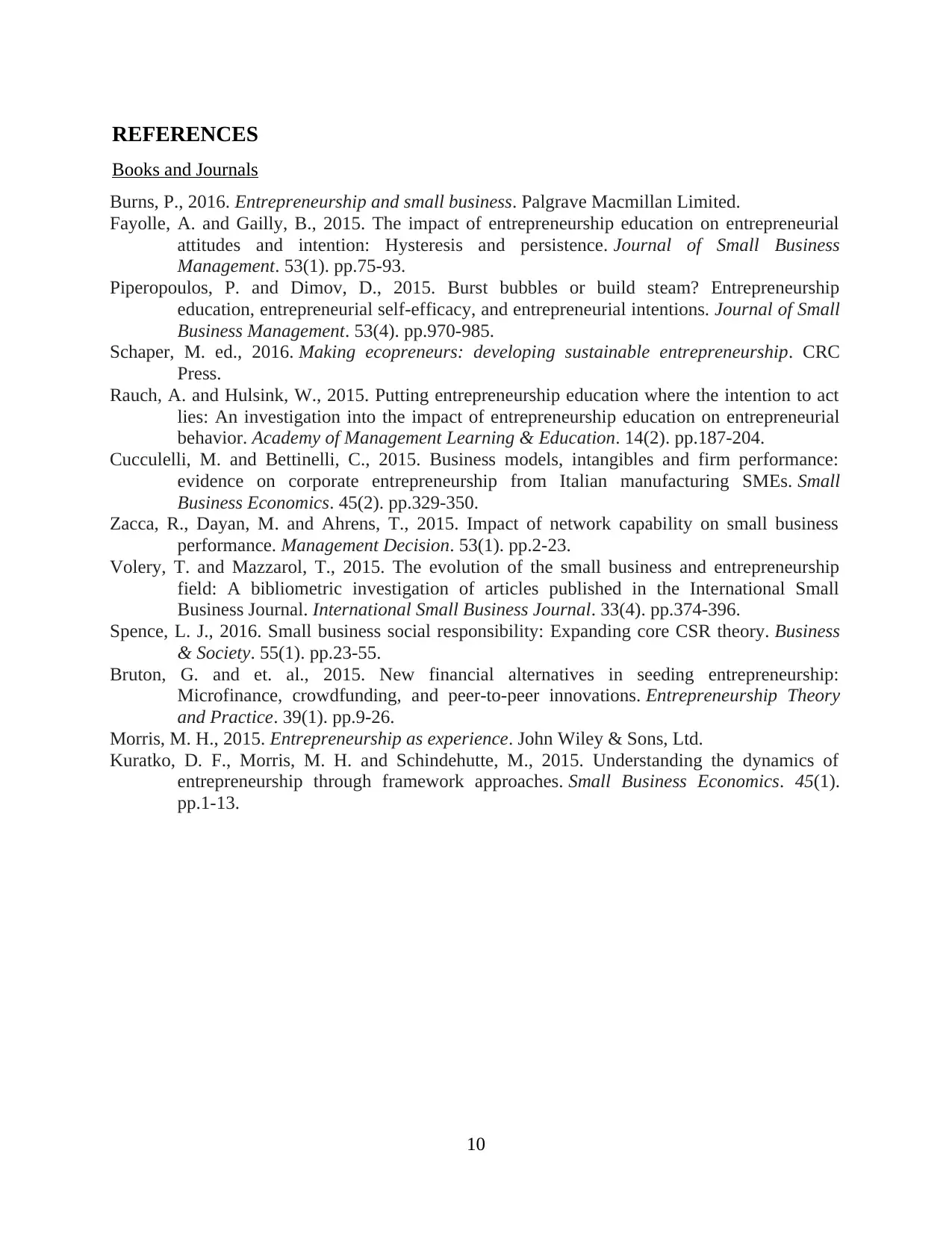
REFERENCES
Books and Journals
Burns, P., 2016. Entrepreneurship and small business. Palgrave Macmillan Limited.
Fayolle, A. and Gailly, B., 2015. The impact of entrepreneurship education on entrepreneurial
attitudes and intention: Hysteresis and persistence. Journal of Small Business
Management. 53(1). pp.75-93.
Piperopoulos, P. and Dimov, D., 2015. Burst bubbles or build steam? Entrepreneurship
education, entrepreneurial self‐efficacy, and entrepreneurial intentions. Journal of Small
Business Management. 53(4). pp.970-985.
Schaper, M. ed., 2016. Making ecopreneurs: developing sustainable entrepreneurship. CRC
Press.
Rauch, A. and Hulsink, W., 2015. Putting entrepreneurship education where the intention to act
lies: An investigation into the impact of entrepreneurship education on entrepreneurial
behavior. Academy of Management Learning & Education. 14(2). pp.187-204.
Cucculelli, M. and Bettinelli, C., 2015. Business models, intangibles and firm performance:
evidence on corporate entrepreneurship from Italian manufacturing SMEs. Small
Business Economics. 45(2). pp.329-350.
Zacca, R., Dayan, M. and Ahrens, T., 2015. Impact of network capability on small business
performance. Management Decision. 53(1). pp.2-23.
Volery, T. and Mazzarol, T., 2015. The evolution of the small business and entrepreneurship
field: A bibliometric investigation of articles published in the International Small
Business Journal. International Small Business Journal. 33(4). pp.374-396.
Spence, L. J., 2016. Small business social responsibility: Expanding core CSR theory. Business
& Society. 55(1). pp.23-55.
Bruton, G. and et. al., 2015. New financial alternatives in seeding entrepreneurship:
Microfinance, crowdfunding, and peer‐to‐peer innovations. Entrepreneurship Theory
and Practice. 39(1). pp.9-26.
Morris, M. H., 2015. Entrepreneurship as experience. John Wiley & Sons, Ltd.
Kuratko, D. F., Morris, M. H. and Schindehutte, M., 2015. Understanding the dynamics of
entrepreneurship through framework approaches. Small Business Economics. 45(1).
pp.1-13.
10
Books and Journals
Burns, P., 2016. Entrepreneurship and small business. Palgrave Macmillan Limited.
Fayolle, A. and Gailly, B., 2015. The impact of entrepreneurship education on entrepreneurial
attitudes and intention: Hysteresis and persistence. Journal of Small Business
Management. 53(1). pp.75-93.
Piperopoulos, P. and Dimov, D., 2015. Burst bubbles or build steam? Entrepreneurship
education, entrepreneurial self‐efficacy, and entrepreneurial intentions. Journal of Small
Business Management. 53(4). pp.970-985.
Schaper, M. ed., 2016. Making ecopreneurs: developing sustainable entrepreneurship. CRC
Press.
Rauch, A. and Hulsink, W., 2015. Putting entrepreneurship education where the intention to act
lies: An investigation into the impact of entrepreneurship education on entrepreneurial
behavior. Academy of Management Learning & Education. 14(2). pp.187-204.
Cucculelli, M. and Bettinelli, C., 2015. Business models, intangibles and firm performance:
evidence on corporate entrepreneurship from Italian manufacturing SMEs. Small
Business Economics. 45(2). pp.329-350.
Zacca, R., Dayan, M. and Ahrens, T., 2015. Impact of network capability on small business
performance. Management Decision. 53(1). pp.2-23.
Volery, T. and Mazzarol, T., 2015. The evolution of the small business and entrepreneurship
field: A bibliometric investigation of articles published in the International Small
Business Journal. International Small Business Journal. 33(4). pp.374-396.
Spence, L. J., 2016. Small business social responsibility: Expanding core CSR theory. Business
& Society. 55(1). pp.23-55.
Bruton, G. and et. al., 2015. New financial alternatives in seeding entrepreneurship:
Microfinance, crowdfunding, and peer‐to‐peer innovations. Entrepreneurship Theory
and Practice. 39(1). pp.9-26.
Morris, M. H., 2015. Entrepreneurship as experience. John Wiley & Sons, Ltd.
Kuratko, D. F., Morris, M. H. and Schindehutte, M., 2015. Understanding the dynamics of
entrepreneurship through framework approaches. Small Business Economics. 45(1).
pp.1-13.
10
1 out of 13
Related Documents
Your All-in-One AI-Powered Toolkit for Academic Success.
+13062052269
info@desklib.com
Available 24*7 on WhatsApp / Email
![[object Object]](/_next/static/media/star-bottom.7253800d.svg)
Unlock your academic potential
© 2024 | Zucol Services PVT LTD | All rights reserved.





